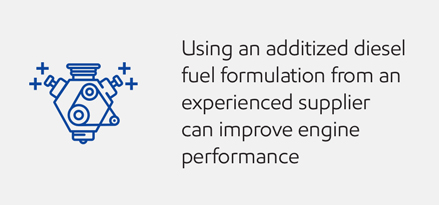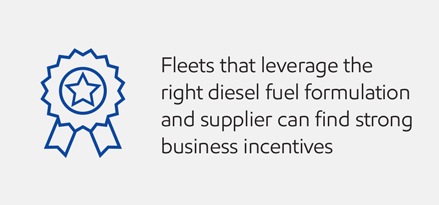Diesel is just diesel – that’s the standard mindset many businesses in the trucking industry have when it comes to the topic despite the many conversations surrounding the rapid development and innovation taking place within the commercial trucking industry.
Fuel isn’t an exciting commodity and often companies and fleet managers don’t include diesel as part of their evaluation criteria when looking at ways to drive their business forward. Yet, there are other considerations both in terms of cost and operational efficiencies that go beyond the fuel itself which could impact your business’ bottom line.
ExxonMobil’s 2019 Outlook for Energy: A View to 2040 highlights that commercial transportation energy demand in Asia Pacific is set to increase thanks to economic growth which will stimulate demand for trucking services. With fuel being one of the largest aspects of an average fleet’s operating budget, fleet managers should look for ways to receive the best possible return on their fuel investments while looking for ways to mitigate the uncertainties of fuel prices. To do this, fleet managers should go back to the basics of choosing the right supplier and the right diesel formulation that can bring about positive impact to their business.

Selecting the right supplier
A reliable diesel fuel supplier with a reputation for quality throughout the diesel fuel supply chain – from inception to handling and delivery – can help you navigate some of the complexity facing fleet managers today.
Experienced suppliers understand the important role fuel plays in a fleet’s business, and enact safeguards such as strict qualifications for carriers, regulatory awareness, product quality integrity and high safety focus to avoid mistakes that could present costly issues for a fleet.

Increasing operational efficiency
Using a high-performing, additized diesel fuel formulation from an experienced supplier can improve engine performance, leading to operational, maintenance and business benefits; all of which make a fleet manager’s job easier along the way.
Some additized diesel fuel formulations offer fuel economy benefits that can allow managers to keep trucks and buses on the road longer which minimizes a fleet’s downtime and also offers environmental benefits with reduced CO₂ and NOx¹ emissions.
As such, instead of writing off diesel as another cost, fleet managers should look at how an evaluation of fuel supplier/choice could help increase fleet efficiency and reduce overall expenditure.
¹CO₂ = Carbon dioxide, NOx = Nitrogen Oxide
Reducing maintenance costs
Improved fuel economy is one way to keep vehicles on the road for longer but the heart of any engine is its fuel system and keeping that system running smoothly is key to increasing overall fleet efficiency.
Like any piece of machinery, fuel systems will eventually degrade with time. However using a high performing diesel, combined with working with a quality supplier and receiving the proper maintenance services can increase an engine’s durability and reduce the stress on the engine’s components while combatting other maintenance areas such as:
The combination of using the right product and working with the right partners can keep trucks and buses out of the workshop for longer periods and help your drivers feel more confident in their vehicle’s performance.

Improving the bottom line
Fleet managers and businesses that recognize the benefits of leveraging the right diesel fuel formulation and supplier can expect to find strong business incentives that offer improved fuel economy and fleet efficiency, as well as more satisfied drivers who pilot more responsive and higher performing trucks and buses. In the long term, these benefits will result in improved bottom lines and margins.
To learn more about which diesel product can provide the best benefits for your business, Esso recommends consulting with your fuel supplier and other industry leaders about the ways in which diesel can work harder for you to stay ahead in a rapidly changing industry.




